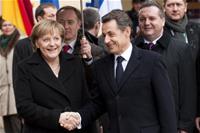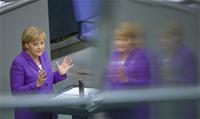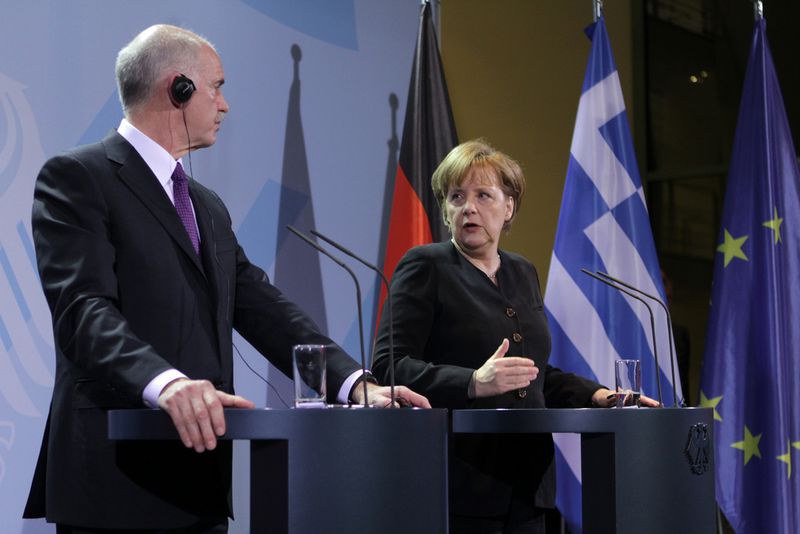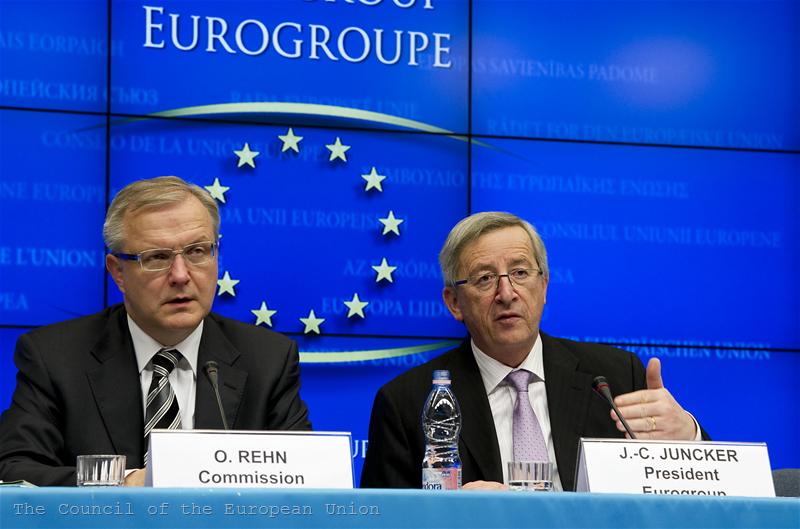History is knocking on Europe's door. Who is going to answer?
Ralitsa Kovacheva, December 16, 2010
 A more European Germany or a more German Europe – this Hamlet-like question fully describes the moods on the eve of the European Council, which is being held today and tomorrow in Brussels.
A more European Germany or a more German Europe – this Hamlet-like question fully describes the moods on the eve of the European Council, which is being held today and tomorrow in Brussels.
The main issue on the agenda, as it gets clear from Herman van Rompuy's, President of the European Council, invitation letter to the EU leaders, will be “the limited amendment to the Treaty in order for a permanent mechanism to be established by the Member States of the euro area to safeguard the financial stability of the euro area as a whole”. The letter says, that Van Rompuy had consulted with all Member States and as a result - draft conclusions of the European Council had been prepared and circulated to all Member States for examination before the Council.
“We need to reach an agreement on a draft decision at our meeting in order for procedures to be launched as fast as possible, both at the EU and national levels, so that this decision can enter into force on 1 January 2013”, Van Rompuy stated.
The leaders will discuss the proposal to create a European Stability Mechanism (ESM), which was already considered by the Council of Finance Ministers (ECOFIN). The proposal was formally submitted on behalf of the Commission, but some believe that it was based on a Franco-German project.
The ESM will be organised on the basis of the currently existing European Financial Stability Facility (EFSF) and will provide financial support for euro area countries under the strict conditions existing at the moment. The current rules, however, will be adapted so as to provide for the participation of private creditors on a case by case basis and in line with IMF's policies.
A major element of the mechanism is that when some assistance is requested, the European Commission and the IMF, together with the European Central Bank, will carry out a “rigorous debt sustainability analysis”. In case the country is considered insolvent, which is defined as an “unexpected event”, it must negotiate a comprehensive restructuring plan with its private creditors, in accordance with IMF's practices in order to restore its debt sustainability.
French sources told the Financial Times that the possibility of a country to be declared insolvent, according to the current proposal, was negligible. According to the French, nothing is being changed except from the possibility the current rescue fund to be extended as long as the crisis continues.
Furthermore, “standardised and identical collective action clauses (CACs) will be included, in such a way as to preserve market liquidity, in the terms and conditions of all new euro area government bonds starting in June 2013 … This would enable creditors to pass a qualified majority decision, agreeing a legally binding change to the terms of payment (standstill, extension of the maturity, interest-rate cut and/or haircut) in the event that the debtor is unable to pay”.
According to Germany, which is the major advocate of the mechanism, linking  the private creditors in it is crucial. However, according to ALDE Group's leader in the European Parliament Guy Verhofstadt, the proposed mechanism is not only just not working, it is even dangerous:
the private creditors in it is crucial. However, according to ALDE Group's leader in the European Parliament Guy Verhofstadt, the proposed mechanism is not only just not working, it is even dangerous:
“However logical and rational the German proposal appears to be, it is in reality an extremely dangerous mechanism, which threatens to undermine the whole currency union. In any case it will send interest rate levels in many eurozone countries soaring even higher, as there is no doubt that funds, banks and investors will demand a substantial additional risk premium once the new rescue mechanism comes into force.”
Guy Verhofstadt, like the prime minister of Luxembourg and Eurogroup chairman Jean-Claude Juncker and Italian Finance Minister Giulio Tremonti, supports the idea of creating common eurobonds as the most powerful expression of solidarity. The idea, however, met strong resistance from Germany, supported by France.
 At a meeting with President Nicolas Sarkozy in Freiburg days before the Council, Chancellor Angela Merkel said that “interest rates and risks are not something that should be spread in this way. Each country must pay its own debts. What is needed first and foremost is greater coherence in the economic policies of the eurozone states”. In the same spirit President Sarkozy spoke as well, who believes the way is toward greater harmonisation in economic, fiscal and budgetary policy. “Only once this is in place can we move on to discuss euro bonds”, Sarkozy said. To give “a good example for Europe as a whole” Germany and France will make every effort to harmonise their tax systems.
At a meeting with President Nicolas Sarkozy in Freiburg days before the Council, Chancellor Angela Merkel said that “interest rates and risks are not something that should be spread in this way. Each country must pay its own debts. What is needed first and foremost is greater coherence in the economic policies of the eurozone states”. In the same spirit President Sarkozy spoke as well, who believes the way is toward greater harmonisation in economic, fiscal and budgetary policy. “Only once this is in place can we move on to discuss euro bonds”, Sarkozy said. To give “a good example for Europe as a whole” Germany and France will make every effort to harmonise their tax systems.
Recently, some commentators are increasingly mentioning the idea of a fiscal union as a salvation for the euro area and it is now obvious that Germany and France are not far from this thought. “We are talking about labour law, about tax law, and if we are to improve the coherence of the economic aspects of the euro zone, then we should target these issues step by step and propose solutions”, Merkel said, quoted by EurActiv. Next year France and Germany will present “structural” proposals on economic coordination, without disclosing any details at this stage.
Nevertheless, Ms Merkel is still being accused of not acting sufficiently “European”, mostly because of her refusal to discuss both the creation of eurobonds and the increase of the size of the rescue fund for the euro area. Except from the outside, in the face of some of the troubled economies, MEPs and even the prime minister of Luxembourg Jean-Claude Juncker, attacks come also from the inside, in the face of the parliamentary opposition in Germany. “In a stormy debate in the Bundestag … the one thing that united almost every speaker was a determination to be the most pro-European. No one sought to blame Ms Merkel for not being German enough”, Financial Times wrote.
According to the paper, Ms Merkel had fiercely defended her pro-European  stance and insisted that the protection of the euro is her highest priority: “Nobody in Europe will be abandoned. Nobody in Europe will be excluded. Europe only succeeds if we work together.”
stance and insisted that the protection of the euro is her highest priority: “Nobody in Europe will be abandoned. Nobody in Europe will be excluded. Europe only succeeds if we work together.”
During the debates in the Bundestag, however, Gesine Lötzsch, co-leader of the Linke party, put the question from another angle. According to her, all the efforts for “saving the euro” were really about “saving our banks from their bad debts”: “It is time for you to admit: are you negotiating on behalf of German citizens, or are you negotiating on behalf of German banks?”, she challenged Chancellor Merkel.
In fact, the question is too reasonable, because German banks have large exposures to Ireland and Greece, like the British (to Ireland), French (to Greece), and Spanish (to Portugal). Against this background it is understandable that Germany and France were at the heart of the idea of reaching agreement with private creditors on the basis of collective action clauses. Thus, creditors will share some of the risk, but hardly as much as they would face if one state just stops paying its debt.
In this sense, the Financial Times predicts difficult, if not crucial year for the euro area. According to an analysis of the Italian UniCredit bank, cited by the newspaper, next year the eurozone will have to refinance or repay 560 billion euro - this is 45 billion euro more than in 2010 and is a record since the creation of the euro so far. Only Portugal accounts for 20 billion of the overall amount, so analysts say the country will follow Ireland and Greece, and will resort to the bail-out fund for the euro area. Moreover, investors are avoiding to buy debt of peripheral economies in the euro area, and a debt sell-off is expected in January. At the same time, euro area governments will try to borrow up to 100 billion euro and for the entire 2011 the amount will swell to 925 billion euro, UniCredit estimates.
From all this it follows that the leaders will have a difficult and decisive meeting. It is almost certain that the permanent stabilisation mechanism will be agreed together with the necessary Treaty changes because there is neither alternative, nor time. Equally certain it is, however, that this will be insufficient for the long-term stability of the euro area and the European Union as a whole.
 And, to answer the question from which we have started - a more European Germany or a more German Europe, I think I cannot say it more clearly and convincingly than Timothy Garton Ash in The Guardian: “A more German Europe would be a better Europe. There are many things about Germany's economic model – its productivity, its consensual labour relations, its focus on product quality, its penetration of emerging markets – that other European countries would do well to emulate.” Of course, there should be a compromise but it depends, again, on Germany, the analyst ends:
And, to answer the question from which we have started - a more European Germany or a more German Europe, I think I cannot say it more clearly and convincingly than Timothy Garton Ash in The Guardian: “A more German Europe would be a better Europe. There are many things about Germany's economic model – its productivity, its consensual labour relations, its focus on product quality, its penetration of emerging markets – that other European countries would do well to emulate.” Of course, there should be a compromise but it depends, again, on Germany, the analyst ends:
“The future of the eurozone now depends on this German leadership. Come on, Frau Bundeskanzlerin, history is knocking at your door. And history only knocks once.”
 | © www.primeminister.gov.gr
| © www.primeminister.gov.gr | © European Commission- Audiovisual Service
| © European Commission- Audiovisual Service | © The Council of the European Union
| © The Council of the European Union